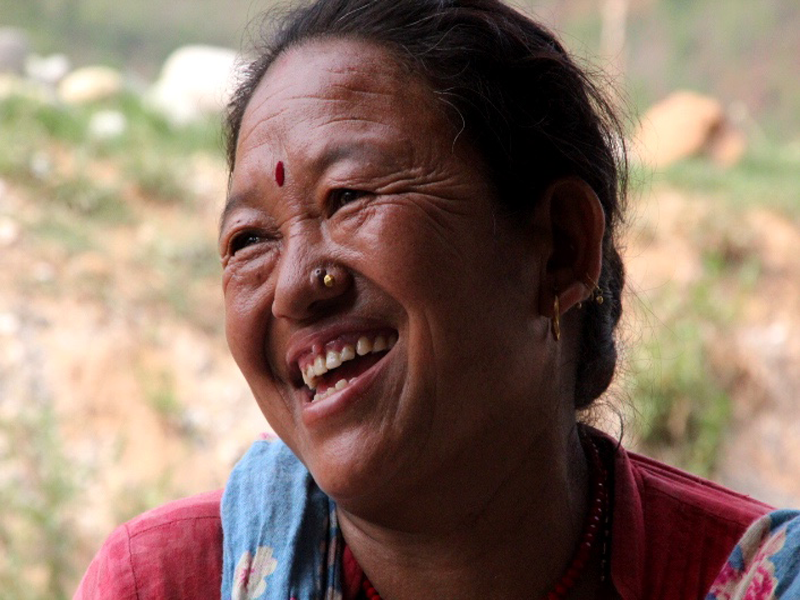

One Gajuri Farmer Takes Advantage of Loans Given at Low Interest Rates

Since Sana Kisan Bikas Bank Ltd. (SKBBL) opened up a branch in Gajuri, it has been easier to ask for, and receive, loans from the Small Farmers Agriculture Cooperative Ltd. (SFACL), Dhana Maya Magar said in an interview. The two largest 2015 earthquakes measuring 7.8 and 7.3 respectively on the Richter Scale devastated 14 districts in Nepal, one of which was the Dhading District, where Gajuri is located. As a result, the Gajuri SFACL offered livelihood restoration loans at two per cent interest, in addition to Nrs. 8,000 gratis, in collaboration with SKBBL.
Together with her family, Magar took advantage of the low interest rate and bought an additional half acre of land, as well as several goats and one buffalo. She said she was scared to not be able to pay back at the start, but that fear subsided as they began growing vegetables in the fall and rice in the spring. She said that, for the first time, the farm became more than a vehicle for sustenance; it became a vehicle for profit. Any excess was brought to a local marketplace and sold. With those profits she has been able to buy a tractor, sell her ox, and plough at least twice as fast with less effort.
Loans at SFACLs are often accompanied by optional educational trainings on survival, saving or spending habits. Before receiving the livelihood restoration loan, Magar said she never saved a penny. In fact, she had never even heard of the concept of saving until it was introduced to her by the Gajuri SKBBL Cooperative. She now puts Nrs. 200 per month aside as personal savings, and Nrs. 105 per month into a group saving's account, which is used as a type of insurance. It enables anyone in the group, provided there is a unanimous vote, to use the money for emergencies like health.
Magar also received a training on how to use bio coal sustainably. Made from sawdust and agricultural waste, bio coal can be used as a replacement for oil or firewood in boilers or furnaces. She said "we used to burn coal in any way we liked" before participating in the training.
The Gajuri SFACL gave Magar a green card for being the "best loan receiver," having always paid monthly payments on time. The green card allows 0.5 per cent to be taken off any loans she receives from the bank. Magar's most recent loan stood at Rs. 700,000.
"And I'm no longer afraid that I won’t be able to pay it back," she added. She no longer has to work long hours under the boiling sun, and earns between Nrs. 300,000 and Nrs. 400,000 yearly. A leader of several women's groups in her community, Magar said the loan has empowered her to become financially capable of taking care of herself, as well as sustaining her family, who live with her. As the interview drew to a close, Magar sighed, then smiled.
"I don’t have to depend on men to have capital, to have my own life.”
Blog & Success Stories
-
Managing On Her Own
Nov 20, 2021 -
Agriculture Empowers One Gajuri Family
Nov 20, 2021 -
Hard Team Work Pays Off
Nov 20, 2021 -
"Everything I own, it's because of the support I received from Sana Kisan."
Nov 19, 2021 -
First Batch of Returnees Successfully Engage in Agricultural Entrepreneurship
Nov 19, 2021

